Meat
Lamb farmers and producers are being urged to ensure their sheep are vaccinated as autumn arrives.
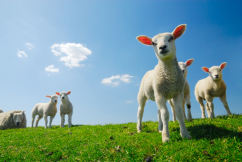
The appeal comes after the results of AHDB Beef & Lamb’s Fallen Stock initiative revealed that certain illnesses in lambs were more prominent during the autumn months.
Research from the project, which ran from April 2014 to June 2015, showed that pulpy kidney, a common clostridia disease, was at its highest levels during October 2014 for lambs receiving hard feed.
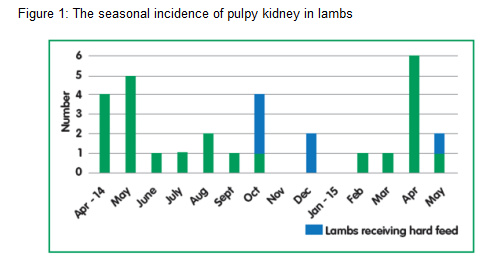
It is believed this can be attributed to a change in their natural diet as the seasons change. Where lambs had been receiving hard feed, most had not received a booster prior to the change in diet.
Furthermore, immunity that they might have obtained from drinking colostrum at birth might have worn off by this time, implying that a vaccination booster could aid them.
“If producers are keeping store lambs during this period, they should be vaccinated ahead of any anticipated adverse weather or other stressors such as moving,” claimed Dr Liz Genever, senior sheep and beef scientist.
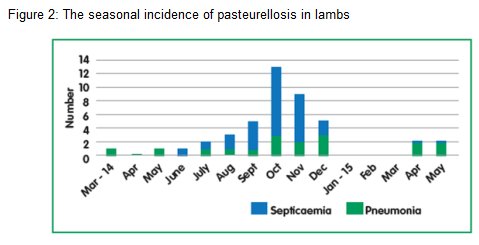 “Lambs that are vaccinated when they are young, from one-month-old, may lose their immunity by the autumn if not given a booster around September.”
“Lambs that are vaccinated when they are young, from one-month-old, may lose their immunity by the autumn if not given a booster around September.”
In addition, the research also proved that cases of pasteurella deaths reached new heights in lambs during October.
“There is a clear need for this, as lambs had been vaccinated according to the data sheet in only 12% of the outbreaks monitored,” added Genever.
“These diseases can be prevented by the administration of appropriate vaccines and should be done as soon as possible.”
The halal sector adds value to the sheep market in particular and, increasingly, for the cattle market. Halal presents a significant market opportunity, which processors can capitalise on, particularly when it comes to sheep meat.

In addition the statistics speak for themselves. Sheep meat is a primary protein choice for Muslim consumers, and with a UK population of 2.7 million – 4.8% of the total population – there is a clear market for sheep meat producers to focus on.
As with any industry, it is vital to fully understand the market and, in the case of the halal sector, keep a keen eye on the Islamic calendar to plan production and deliver products at key times of the year to maximise the market’s full potential.
After all, the Muslim community consumes around 20% of all the sheep meat sold in England, with consumption peaking around the Ramadan and Eid festivals.
Processors should plan accordingly with suppliers, to target the Muslim market throughout the year. Ramadan, for example, falls in the ninth lunar month of the Islamic calendar, when nothing is eaten between dawn and sunset. Food is, however, celebrated at larger social gatherings in the evenings, helping to drive up demand. The Islamic calendar is lunar-based, so dates move back about 10 to 11 days every year.
This year Ramadan began on 18 June. Next year it will begin on 7 June, underlining how crucial it is to plan to maximise the market’s potential.
Similarly, the festival of Eid-al-Adha is held approximately 70 days after the end of Ramadan, where it is incumbent upon every Muslim to follow in the footsteps of the Prophet Abraham and have an animal slaughtered as an offering to God. Called the Qurbani, meat is received in three portions – one for the person buying, one for friends and neighbours, and one for charity, again helping drive a spike in demand. During this period, the community looks for mature animals, aged six months or older that are fit, healthy and lean.
Further opportunities are presented in export markets. The UK is the biggest sheep meat producer in Europe and the largest exporter. The UK exports around the margin of 35% of its sheep meat production, the vast majority of which goes to Europe, and Europe’s Muslim population is expected to grow from 6% in 2010 to 8% in 2030. With a potential 15.4 million Muslim customers in Europe, we are in a strong position to cater for the demand. France, for example, is the UK’s largest export market for sheep meat and, with a considerable Muslim population, represents a significant market opportunity.
Indeed, many supermarkets in France now offer halal-specific aisles. Further afield, with growing market access and approvals, the UK is in a good position to capitalise on global demand for halal products.
The picture looks positive. While public perception of halal is often tainted by a lack of understanding of the sector, the reality is that it presents a valuable market opportunity. By fully understanding the market and key dates in the Islamic calendar, the UK sheep meat industry is ideally placed to reap the rewards offered by the halal sector.
Therefore, there are fantastic opportunities that the halal market presents the sheep meat sector. AHDB Beef & Lamb has produced a number of resources to help the industry harness the market’s potential.
Other resources include our halal cuts posters and the Lamb Cutting Guide for the halal market, developed as a training tool and to provide a single comprehensive specification to ensure consistency throughout the halal industry. Our Halal Meat Facts booklet, for example, also gives a snapshot of key statistics and the opportunities presented by the sector in the UK and in export markets.
Further information on halal can be found in the halal section of the AHDB Beef & Lamb Trade website www.qsmbeefandlamb.co.uk and the Corporate Publications section of the AHDB Beef & Lamb website beefandlamb.ahdb.org.uk.
British produce accounts for 73% of all lamb facings in supermarkets.
According to AHDB Beef & Lamb’s Beef and Lamb Country of Origin Survey, just under three-quarters of all lamb products displayed were British. This is up from 71% in June 2014. Aldi, Budgens, Morrisons and Waitrose all had 100% British lamb facings while Marks & Spencer scored 69%, Asda and Tesco both scored 66% and Lidl had 55% of British facings. Sainsbury’s had 54% with The Co-operative bringing up the rear with just 38% of its lamb facings being British.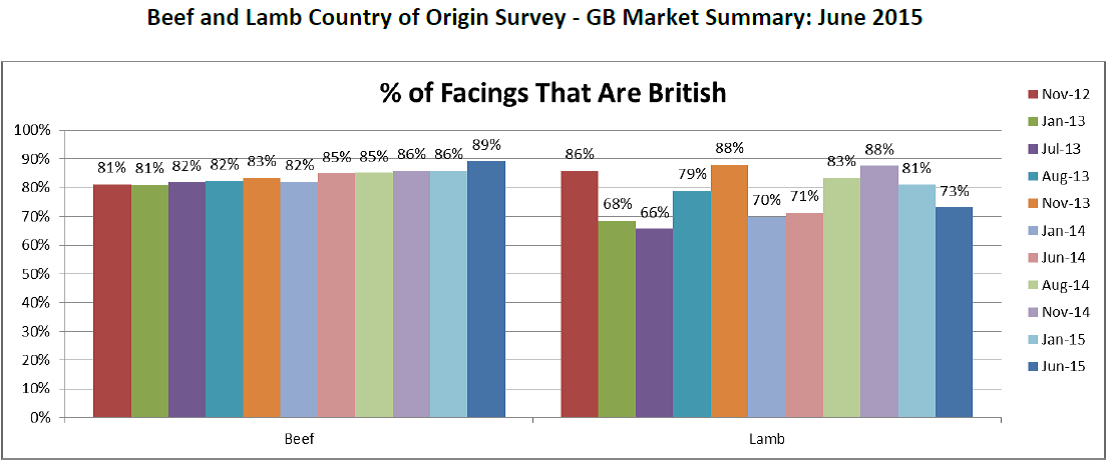
Talking at this morning’s Royal Welsh Show, Dai Davies, chairman of Hybu Cig Cymru – Meat Promotion Wales, criticised the retailers not stocking enough British lamb. “I urge them to reconsider their sourcing policies and decide whether they really want to sacrifice the long term future of the UK’s supply chain for a short term gain.”
Last week HCC announced plans to improve sales of the lamb industry which included campaigning retailers. “We have been talking to the multiple retailers about their roles, urging them to give greater prominence to Welsh Lamb and we are diverting more money into our annual Welsh Lamb advertising campaign, launching it almost two months earlier than normal,” said Davies.
Asda recently pledged to support the UK’s sheep farming industry by ensuring that most of its lamb will be UK-sourced as of mid-July.
AHDB Beef & Lamb chairman Stuart Roberts welcomed this announcement. “I am writing to Asda to congratulate them on the move to source more home-produced lamb. Moreover, since we have just benchmarked the supermarket – along with all the other multiple retailers – as part of our Lambwatch work to track facings of British lamb, I will be offering to repeat the exercise in six weeks’ time to show how far the retailer has moved forward.
“I think credit should also go to those retailers who consistently score highly in our research in terms of stocking British lamb. Aldi, Budgens, Morrisons and Waitrose were all found to have 100% British in the June survey.
” On the beef side, 89% of facings in the supermarkets in June were British, up from 85% in June 2014. Aldi, Budgens, The Co-operative, Lidl, M&S, Morrisons and Waitrose all had 100% British beef facings. Asda had 71%, Sainsbury’s had 97% and Tesco had 87%.
New overseas markets are continuing to provide fresh opportunities for exporting Welsh Lamb and Welsh Beef, according to Hybu Cig Cymru – Meat Promotion Wales (HCC).

HCC chairman Dai Davies believes the future of Welsh red meat is looking affluent . At the opening day of the Royal Welsh Show he told a breakfast reception: “We are hopeful that we will soon be able to export to the USA and to more countries in the Middle East.
“Wales is the largest sheep producing region in Europe and the biggest exporter in volume, not only to the EU but also to third countries.
“We are therefore pleased to have received a second tranche of funding from the EU to further develop our export trade, particularly to Scandinavia which we believe offers a great potential to our exporters.” Davies has expressed gratitude to the Welsh Government for providing HCC with a £400,000 investment through enhanced funding over the last year.
“Our analysis shows that this has resulted in a huge £6.1 million return from the international marketplace, which is excellent news for the Welsh economy.”
Additionally, Davies is confident that HCC’s involvement with EID Cymru will assist in increasing the demand for Welsh Lamb both on a local and international level.
EID Cymru is an innovative Welsh sheep electronic recording system and database, allowing sheep activity to be traced throughout the supply chain. It also provides a robust movement and traceability system.
“Once fully operational, EID Cymru will play an important role in providing both domestic and international buyers with additional reassurance over the traceability and provenance of Welsh Lamb.”
Rupert Hargreaves and Jamie Petchell’s new company, Global Plant Genetics, will specialise in soft-fruit and asparagus seed supply and intellectual property management
faced with an increasingly mature UK soft-fruit industry, two well-known faces have set up a new company to take advantage of overseas opportunities in breeding and seed supply.
Founder and previous shareholder of Hargreaves Plants, Rupert Hargreaves, along with the company’s former commercial director, Jamie Petchell, have set up Global Plant Genetics – a new venture that will specialise in berries and asparagus.
Asked why the two have decided to go it alone, Petchell says: “We see more opportunities globally than we do in the UK, so this new company is more of a global venture.”
He explains that the business will focus on soft-fruit and asparagus, where the duo’s experience lies, but they may also look at other crops. It will cover four areas: supplying plants and seeds, intellectual property management, joint venture business development and technical support. The first two areas will overlap with the Hargreaves business, although both will also offer something different, according to Petchell. “On the intellectual property management, we saw an opportunity to set up with more of a fresh approach. We feel there are market opportunities to target a more limited range of breeders at an earlier stage in their programmes. We will have an in-depth involvement with breeding, so rather than just being a recipient of a lot of new stuff, we will be able to target new varieties for specific markets.”
The new company will not grow plants itself, but will have
The joint venture opportunities will see the business partnering with companies in emerging countries, as Petchell notes that due to maturing markets and changing climates, this is where most investment is now focused. “The world population is currently around 6.2 billion, and it’s predicted to reach nine billion by 2050, with most of that in the developing world. There is lots more investment available in these markets.”
Global Plant Genetics will initially target African countries, and Petchell says some deals are close to being finalised despite this being early days – the company was only established in May of this year.
“There are just two of us at the moment, though rapidly we are going to need more support. I am based at home in Lincolnshire, and Rupert is based in Norfolk,” he says.
“We will have a heavy presence in the UK in terms of asparagus seeds, plants and crowns, and we will have a presence in new varieties of soft fruit, although this market is more difficult due to the many proprietary breeding programmes. We are on the look-out, like everyone, for the variety with the highest yields and the best taste, and if we find it then we will expand this side of the business.
“The UK soft-fruit market is not the main focus of the business due to market difficulties.”
With its USPs of going back to basics with breeders so they can target specific markets, and a lack of restriction on seed supply through working with various nurseries, Global Plant Genetics has got its sights set on the future.
And using their 50 years of combined experience, Petchell and Hargreaves certainly have the contacts and the knowledge to succeed.

Mackey, who is currently head of industry development at Quality Meat Scotland, will be working alongside current chief executive Ron McHattie, before his retirement in the autumn.
Aberdeen-Angus Cattle Society president David Evans is excited to welcome Mackey on board: “The Society is the fastest-growing beef cattle Society in the UK and continues to outpace nearly all other Societies in terms of both pedigree and commercial cattle numbers.
“Mr Mackey’s wide-ranging industry experience places him in an ideal position to help the breed capitalise on existing retail relationships, at the same time as developing new partnerships across the supply chain. I look forward to working with Johnny once he takes up his position and would like to record the Society’s thanks to Ron McHattie for all he has done for the breed in his time with the Society.”
Mackey has previously worked alongside NFU Scotland, as well as being involved in several other industry roles, before taking up his new post. He said: “The Aberdeen-Angus breed is well recognised the world over and I believe UK Aberdeen-Angus breeders have a lot to offer the world, both in terms of genetics and management practice.
“I’m looking forward to working with our existing retail partners to further develop the market for UK Aberdeen-Angus beef and ensure a sustainable, profitable future for all involved with the breed, both at a pedigree and commercial level.”
– See more at: http://www.meatinfo.co.uk/news/fullstory.php/aid/18456/Aberdeen-Angus_Cattle_Society_appoints_new_chief_executive.html#sthash.I31MPIn3.dpuf
Butchers from the West Midlands have won the England heat of the WorldSkills UK contest.
John Brereton, 40, butchery manager at Ludlow Food Centre, and Matthew Parkes, 21-year-old assistant manager at Willenhall’s Walter Smith Fine Foods, have their sights set on sealing a place in the Butchery WorldSkills UK National Competition Final in November, following their triumph in the regional heats for England. The WorldSkills UK National Skills Competitions are aimed at developing training programmes and apprenticeships, as well as nurturing skills within the industry. Butchery is just one of more than 60 trades showcased in this year’s competition. Hosted at Leeds City College, the England heat saw nine butchers battle it out in the hopes of advancing to the next stage. “It was a pretty tough competition and there was a lot of talent on display,” said Brereton. “Although I was pleased with my work, my heart was racing until they announced the heat result, and I was overjoyed to win. “I hope that winning my heat is enough to qualify for the WorldSkills final, which looks like a huge and challenging event. It’s not just about competing, the competition gets you to think outside the box and become more creative.” Meanwhile, Parkes was surprised at his success: “I was very proud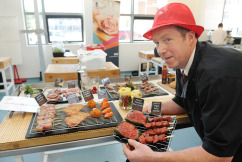
to win the heat, because I was up against some very talented butchers. It means a lot to me. My employer prides itself on producing award-winning products and butchers and it was nice to see the other lads from the company doing well. “I still think I could have done some things a bit better and, if I get through to the final, I know my manager will be pushing me more and more. I take pride in my work and feel like I could push myself to the absolute limit to win the competition.” Brereton and Parkes now have to wait until next month to hear if they have advanced into the next round. In order to do so, they must be in the six top-scoring butchers from the combined Wales, Northern Ireland and England three heats. The finals will be held at The Skills Show at the NEC in Birmingham from 19-21 November.
In an effort to support more smaller caterers and encourage customers to sample more fresh meat, JJ Food Service has introduced smaller pack sizes for its fresh meat and poultry.

In the past only available in 10kg cases, its fresh Welsh and Dorset lamb neck fillets are now also sold in 5kg packs (2×2.5kg), while fresh chicken is available in 2.5kg packs. Lamb shoulders will soon be available in 4kg packs (2x2kg shoulders), down from 8kg.
According to the brand, the move will provide more manageable packs to help chefs, butchers, retailers and consumers to sample the fresh offering.
Ali Guvemli, chief products officer, said: “Our fresh lamb is free-range and has been produced from prime, fully-traceable, farm-assured animals. The range has been extremely popular with restaurants and hotels, but not everyone has the fridge space for large quantities.”
He added that the new packs offered great margins for caterers. “Our fresh meat and poultry prices are up to three times cheaper than the major supermarkets and offer excellent margins for caterers.”
Gloucester Services has opened a new southbound site, enabling commuters to get their meat while filling up their car.
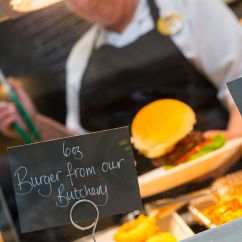 Located between junctions 12 and 11A of the M5, the new southbound services is run by the Westmorland Family, and has a farm shop that sells products from over 130 local suppliers (within 30 miles) and 70 regional suppliers (30-50 mile radius). There is also a traditional butcher’s counter, which only stocks meat from the county.
Located between junctions 12 and 11A of the M5, the new southbound services is run by the Westmorland Family, and has a farm shop that sells products from over 130 local suppliers (within 30 miles) and 70 regional suppliers (30-50 mile radius). There is also a traditional butcher’s counter, which only stocks meat from the county.
Sarah Dunning, CEO of the Westmorland Family, said: “Local food and local producers are at the heart of our offering, alongside quality local staff – it’s what makes our business special, it sets us apart.
“We pride ourselves on having an old-fashioned butcher’s, hanging the meat on the bone for up to three weeks and offering traditional cuts of meat – from sirloin on the bone and t-bone steaks, cut just as you like them, to seasonal specialities such as sweetbreads.”
Its northbound services has been open since May 2014, with more than 500,000 locally sourced meals and 33,000 Cinderhill sausage rolls sold in the past 12 months.
Dunning said the combination of a motorway services and locally-sourced food will help drive awareness of what the area has to offer. She said: “Bringing the concept of local food to the motorway is wonderfully democratic. Suppliers are given a shop window and accessible markets, motorists enjoy great local food, and we’re preserving regional foods and identity. It’s a game where everyone wins. Good-quality locally produced food shouldn’t be the sole preserve of high-end shops, it should be affordable and available to everyone. That’s why we serve it on the motorway.”